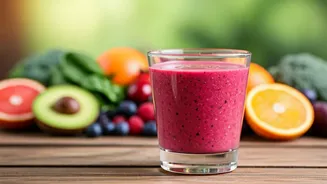Heart-Healthy Beverages
Maintaining a healthy heart requires a multifaceted approach, and dietary choices play a crucial role. Incorporating certain beverages into your routine
can offer significant benefits. This article spotlights five drinks known for their potential to help prevent the formation of artery plaque and boost overall heart health. Remember, a balanced diet coupled with a healthy lifestyle is key. These drinks offer a supplementary benefit, supporting your cardiovascular system and contributing to a healthier you. The focus is on providing easily accessible and natural methods to support heart health, making it an accessible goal for everyone. This information should not replace advice from a medical professional, and it is always wise to consult with them.
Green Tea’s Power
Green tea is packed with antioxidants, particularly catechins, which are linked to reducing LDL cholesterol, often called "bad" cholesterol, and inhibiting the build-up of plaque in arteries. Regular consumption of green tea is associated with improved blood vessel function and a reduced risk of heart disease. Brewing green tea properly helps extract the maximum benefits, ensuring you're getting the full range of health-boosting compounds. The ritual of preparing and savoring green tea can also promote relaxation, reducing stress—a known contributor to cardiovascular problems. The warm, comforting nature of the drink can add a positive dimension to your daily routine, enhancing both physical and mental well-being. This, combined with its effects on blood lipids and vascular health, makes green tea a valuable addition to your heart-healthy diet.
The Beetroot Advantage
Beetroot juice is a powerhouse of nutrients, especially nitrates, which the body converts into nitric oxide. Nitric oxide helps relax and widen blood vessels, lowering blood pressure and enhancing blood flow. This effect is crucial for preventing plaque buildup and maintaining a healthy heart. Beets also contain antioxidants and anti-inflammatory compounds that protect against cardiovascular damage. Consuming beetroot juice regularly has been shown to improve exercise performance and overall cardiovascular health. Consider adding beetroot to your daily diet, either in juice form or incorporating it into your meals. While its earthy flavor might not appeal to everyone at first, it can be easily masked in smoothies or combined with fruits for a more palatable taste. The benefits associated with this vibrant vegetable are certainly worth it.
Pomegranate's Protection
Pomegranate juice is rich in antioxidants, particularly polyphenols, which help protect blood vessels from damage and reduce inflammation. These compounds can also help lower blood pressure and improve blood flow, thereby preventing plaque buildup. Regular consumption of pomegranate juice has been linked to a reduced risk of heart disease. The vibrant color and delicious taste make it an appealing addition to your diet. Incorporate pomegranate juice into your breakfast routine or as a refreshing beverage throughout the day. When selecting pomegranate juice, opt for options with no added sugar to maximize its health benefits. The antioxidants present in pomegranate are potent allies in supporting cardiovascular health, contributing to long-term well-being and a healthier heart.
Citrusy Boost for Hearts
Citrus fruits like oranges, grapefruits, and lemons are packed with vitamin C and other antioxidants that protect blood vessels from damage. These antioxidants help prevent plaque formation by reducing oxidative stress and inflammation. Vitamin C also aids in the production of collagen, a protein that strengthens blood vessels. Drinking fresh citrus juice or adding citrus fruits to your diet offers a refreshing way to boost your heart health. Incorporating citrus fruits into your diet is a simple yet effective strategy. Enjoy a glass of freshly squeezed orange juice with your breakfast, or add lemon and lime to your water for a refreshing and hydrating beverage throughout the day. This simple addition can improve cardiovascular health and provide a delicious and healthy way to support your heart.
Tomato's Cardiovascular Support
Tomatoes, and tomato juice, contain lycopene, a potent antioxidant that can help prevent heart disease. Lycopene helps reduce LDL cholesterol oxidation, thereby reducing the risk of plaque formation. They are also a good source of potassium, which is essential for maintaining healthy blood pressure levels. Consuming tomatoes regularly, in any form – fresh, cooked, or as juice – is beneficial for cardiovascular health. Adding tomatoes to your diet is easy; use them in salads, soups, or as part of your main meals. Making tomato juice a part of your daily intake can bring substantial advantages. Tomato's benefits are a delicious way to take proactive steps towards improved heart health, making it an accessible component of any balanced diet.














